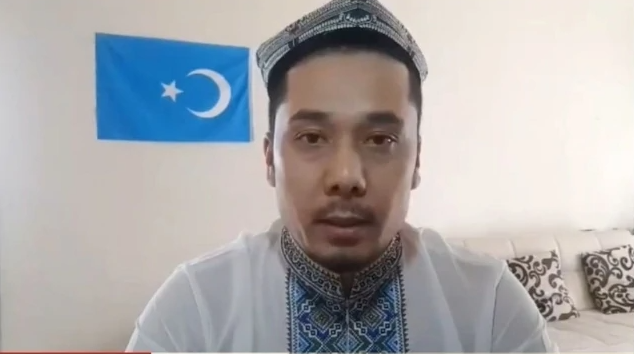Abdurahman has four minutes to sum up a life and a family catastrophe that has shattered his world.
He stares out earnestly at his invisible audience, speaking rapidly to cram everything in. Perhaps someone out there has the power to change their destiny. His story must somehow work its way into their hearts and spur them to action.
So far, his YouTube video has only attracted 242 followers, a drop in the ocean compared with the 4.9 million of Hitchcock’s “Psycho” in the list of recommendations underneath. But his story is every bit as compelling, as horrific, and full of suspense as the Hollywood thriller. The only difference is that his characters and his story are real.
He tries to encapsulate the horror in which his life has been engulfed since clampdowns and incarcerations began in earnest in his homeland. There is no creepy music, no build up; only bare facts and dates.
He treats us to live footage of the WeChat social media feeds that bombarded him from the homeland in 2017, when his brothers were drafted in by the local community police officer to blackmail him into returning home.
First, we hear the persuasive and gentle tones of Shahi Merdan, the officer, addressing him as his “little brother.” We even get to know his telephone number: 18099772828, but his photo has since been replaced by a squad of marching soldiers.
“Come home little brother. You’ve got so many relatives here, and so has your wife. If you stay, there you’re going to get them all into a lot of trouble. That’s not good is it? As soon as you can, bring your household back here, come over to see me, we’ll have a few formalities to go through, and then you can leave,” reminding him once more that if he failed to return he would “cause them a lot of trouble.”
Another male voice breaks in. It’s Ehmetjan, his oldest brother. “Are you there Abdurahman? If you are, please talk to me.” Yet another older brother, speaks. “Assalamu aleykum! How are you? Are you ok? It would be best if you finished up over there and came back. There’s no point in staying any longer.”
Finally, a brother speaks again. “How can you go all that way and not come back? Think about those who have looked after you and raised you. Think about all your relatives, young and old. I’m not doing a great job of explaining everything here, but just come back, straightaway.” He started to threaten Abdurahman, “If you don’t, it won’t go well for your family. Just come back, and answer all their questions; from beginning to end, tell them what you’ve been up to, where you’ve been etc., and then of course you’ll be able to return if there’s no problem.”
He continued to press him on family loyalty and his responsibilities of a son to obey his parents, an inalienable value of Uyghur culture. “What’s all this about not listening to your parents who have looked after you all these years? How do you think they feel when you do this? How can you face them? What do you plan to do? Think long and hard about what you’re doing, little brother.”
When Abdurahman refused to give in and return, his pensioner parents were hauled off to detention in December 2018. He has no idea of their current whereabouts. Their crime? Being unable to persuade their wayward son to return to his homeland.
Now for his mother, 61 year old Dileysem Kerem, and his 64 year old father, Memet Niyaz, their reward for thirty years toil on the land, is at its very best an overcrowded cell and starvation rations, and at its worst, we can only guess.
As for his second oldest brother, Ahetjan Memet, on paper he did everything right. He enrolled on a bona fide course at Urumqi’s CCP-accredited Islam University, where he studied to be a religious teacher for five years from 2000–2005. After graduating he was appointed as Imam at one of the major mosques in Xinjiang.
But for a “crime” as yet unknown, he was arrested in April 2017 and sentenced to 15 years in prison. As if this was not severe enough, the sentence was later extended to 20 years.
Despite being a close knit and supportive family, Abdurahman’s biggest disappointment following his brother’s imprisonment was to witness both his other brothers turning their backs on Ahetjan and his wife. Very often associates and family members are arrested and sentenced equally harshly simply for knowing a detainee, and they were afraid not only to visit him, but even to have his wife’s number on their phone.
“Ahetjan felt deserted,” Abdurahman told Bitter Winter. “And his wife, who had gone back to the capital to be by his side, felt absolutely abandoned,” he said bitterly. “Such is the fear that the CCP has gripped my people with, that even families have been irrevocably torn apart. That my brothers, from the same mother, could turn their backs on their own flesh and blood at his most needy time, is a secret I am so ashamed about that I have never told anyone.”
“But the CCP has made my people like this,” he said bitterly. “It has nearly driven me mad.”
Abdurahman is studying international relations in Turkey, where he and his wife live with his toddler and five-and-a-half-year-old child. The tragedy at home obsesses and preoccupies him giving him sleepless nights, depression, and waves of hopelessness.
As for Abdurahman, he is determined to continue fighting to release his family. He is teaching his oldest child Uyghur, and is determined they both grow up knowing at least that their grandparents and uncle exist, and that one day they might see them. “But how can I explain what a grandparent is? How can I explain this evil that has befallen theirs? What can I tell them about the crime of being Uyghur?”

